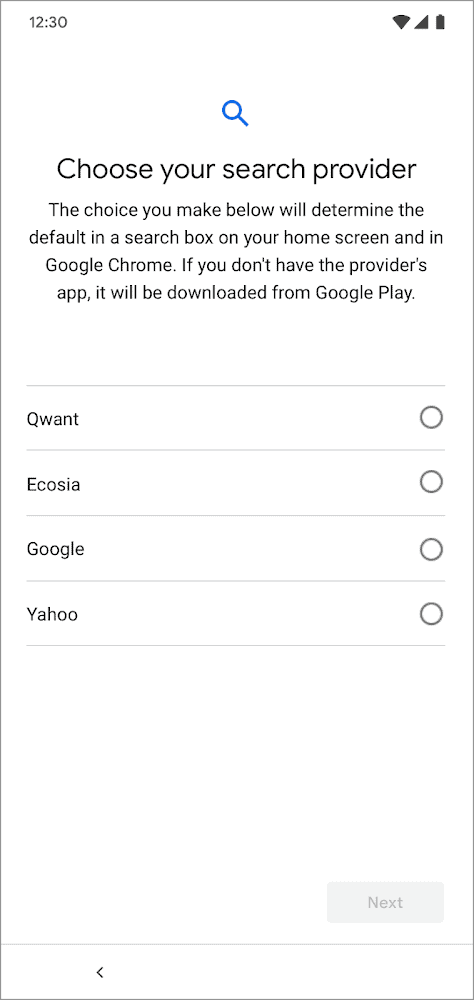by Martin Brinkmann on August 05, 2019 in Google Android – 8 comments
Android devices operated in the European Union will soon display a selection of search engines to users. Three search engines, next to Google Search, which is the default on most Android devices, will be presented to the user of the device; third-party earch engines need to fill out an application form and may need to pay Google for the inclusion.
Google was ordered to pay a record fine of 4.3 Billion Euro because of anti-competitive practices surrounding the company’s search engine Google Search and other Google applications on Android.

The upcoming search engine selection screen displays three alternative search engines to Android users from the European Union. Most Android devices come with Google Search as the default search engine. Android users can install different search engines on their devices but 95% of all searches use Google Search as the search engine on Android according to the EU. The EU regulators believe that the dominance of Google Search can be attributed partially to Google making deals with manufacturers to make Google Search and apps the default on Android.
Google plans to display the choice screen during initial setup of the device. Users need to select one of the listed search engines during setup to proceed. The selected provider will be set as the search provider in the search box on the home screen, in Chrome as the default search engine, and the search app of the selected provider will be installed as well.
The effect of a user selecting a search provider from the choice screen will be to (i) set the search provider in a home screen search box to the selected provider, (ii) set the default search provider in Chrome (if installed) to the selected provider, and (iii) install the search app of the selected provider (if not already installed).
Google plans to start showing the choice screen in early 2020.
Search providers need to meet certain requirements to be eligible for inclusion. The requirements are listed on this support page on the Android website. Criteria include that a localized version is provided, that the search provider has a search app that is available on Google Play, that it is a general search provider and not a specialized one, and that the search provider provides Google will the necessary technical assets.
Google rolled out choice screens on Google Play in April 2019 to users from the European Union. The choice screens presented a list of additional search providers and mobile browsers to users. These were displayed without extra charge to search engine companies or browser makers.
Pay for inclusion
Search providers who want to be included need to fill out an application form and Google wants to auction off spots in the recommendations listing to the highest bidder for each country. Search providers need to set a price that they are willing to pay to Google each time a user selects their search engine from the choice screen. Google set a minimum price which it has not disclosed and will keep bids by search engines private.
The three highest bidders that exceed the minimum will be presented to users in random order next to Google Search.
Google will pick search engines randomly from the list of providers that applied if fewer than three search engines bid or if bids remain under the limit.
“An auction is a fair and objective method to determine which search providers are included in the choice screen.” according to Google. Several search engine companies and operators have criticized Google for the auction system. Gabriel Weinberg, CEO of DuckDuckGo criticized the auction system in a tweet on Twitter:
A pay-to-play auction with only 4 slots means consumers won’t get all the choices they deserve, and Google will profit at the expense of the competition.
Looking Back
In 2009, Microsoft faced a similar situation in the European Union. Internet Explorer was the dominating browser thanks to its inclusion in the Windows operating system. Microsoft agreed to display a browser ballot screen to users from the European Union. The screen listed up to twelve different browsers to users during setup. Browsers were selected based on popularity and displayed in random order; companies did not have to pay for inclusion.
Opera Software was one of the companies that benefited from the inclusion.The company revealed that downloads of its Opera web browser tripled after the browser ballot screen started to show up in the EU.
Closing Words
The auction system favors companies with deep pockets; while it is certainly possible that search engine providers fill out the application form without putting a bid in, it seems likely that search engine choice won’t be based on popularity but on financial resources. Search engines like Startpage or DuckDuckGo cannot compete financially with multi-billion Dollar companies such as Microsoft and its Bing search engine or Yahoo, and it is quite plausible that Bing or Yahoo will dominate the listings in the EU as a consequence.
A fair system would give users more choice, and suggest the most popular search engines in each region to the user. A “more” option could also be implemented to provide users with another list of potential search engines.
Now You: What is your take on the system?